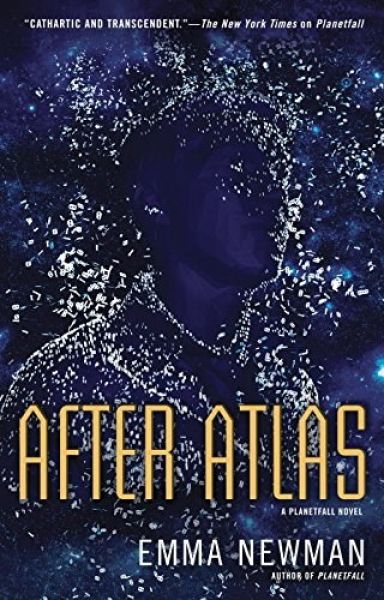A Shining Artifact of the Past
After Atlas (Planetfall, volume 2)
By Emma Newman

7 Jan, 2017
0 comments
Emma Newman’s 2016 After Atlas is a sequel to her 2015 novel Planetfall.
The Pathfinder, Lee Suh-Mi, led her people to a glorious destiny among the stars. The Pathfinder’s starship only had room for the chosen few. Carlos Moreno’s mother made the cut, but Carlos and his father did not. His father then joined a community of starship rejectees, one led by a Lee deputy named Alejandro Casales, dragging an unhappy young Carlos in his wake. It took years for Carlos to escape.
Decades later, Carlos is a prized asset of the Noropean Ministry of Justice. He is a talented investigator whose indentured status ensures that his efforts on the MOJ’s behalf will not be sabotaged by nonsense like so-called human rights.
When Casales’ dismembered corpse is discovered in a posh English hotel, three super-national governments — Europe, Norope, and America — are thrown into a tizzy. It’s important that the case be closed as quickly as possible. Carlos’ knowledge of Alejandro Casales and the Circle make him a logical choice to investigate the case.
It may be relevant that a time capsule left behind by Lee is soon to be opened. It is believed to contain the technology secrets of her starship. Perhaps it is no coincidence that Casales was murdered just before the capsule is due to be opened. Or perhaps it is…. Carlos is determined to find out.
Carlos has avoided contact with Casale’s Circle since he walked away from it twenty years earlier. The Circle he finds now is very different from the one that seduced his father. That Circle was an austere community of people left behind by the Pathfinder, one that rejected many modern conveniences like food-printers and cranial implants in favour of more authentic experiences like hard work and deprivation. Today’s Circle still keeps a firm hand on its members, but it owns an unexpectedly large patent portfolio for an anti-technology community.
Carlos is very good at his job. He is also a whiz at making powerful enemies. Enemies who can afford to buy an indentured slave’s contract merely out of spite.…
~oOo~
As was the case with Planetfall, this book was enjoyable right up until the grand finale. Two books are not a statistically valid sample, but perhaps they are sufficient to hypothesize that Newman has a fondness for melodramatic endings that don’t play well with the rest of the novel.
When I reviewed Planetfall, I speculated that Earth would turn out to be better than Planetfall’s protagonist, Renata Ghali, remembered it. Well, I give myself a C for effort. The average person on Earth would probably think that Renata’s vision of the planet is unduly harsh. Renata believed that Earth is used up and worn out. While we see no actual evidence that this is true, the bad guys in this book are doing their best to make sure that this vision comes true.
When real world history takes a dramatic turn, there’s an odd publishing penumbra during which books written before the dramatic turn are finally coming out — long after their imagined future history became obsolete. After Atlas avoids this pitfall. Newman’s England and Norope could easily be an author’s reaction to that shocking surprise of Brexit. Norope is a union of the Nordic European states, plus England. It is a glorious recapitulation of the Dark Ages’ Danelaw . At least it’s nicer than the catastrophic 2017 Charlie Stross recently predicted.
Right up to (but not including) the end, the novel is an engaging detective story set in a rather dystopian version of England, with a foray into an America that is even worse. The nation is ruled by gov-corps. Only a handful of cultists refuse to submit to the corporate panopticon state, which has washed its hands of any namby-pamby notions of human rights [1]. Which is to say, it is worse than the present in degree rather than kind. The primary difference is that inequality has been enthusiastically embraced and the wealthy gov-corp elites have become an acknowledged legal aristocracy, instead of a merely de facto one.
After Atlas is available here.
1: We don’t see much of America in this book, but what we do see suggests that North America has become the same sort of corporate panopticon state, distinguished only by its flourish of US-style racism. Being seen in public while non-white is a bad idea, especially if your documents are not in order. Like minorities and immigrants in England, but worse.
